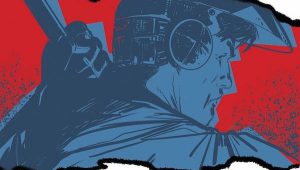‘The Fix #1:’ Comic Book Review (To Serve, Protect, and a Little Bit More)
The future, ladies and gents, is now. I rarely carry cash, get most of my sundries online, and my phone has a touch screen and
The future, ladies and gents, is now. I rarely carry cash, get most of my sundries online, and my phone has a touch screen and
How many times has this happened to you? You’re in the Sudan for years trying to help the natives, and then you get a message
Gravity. Not only a force tethering us to the planet, but pulling us to specific people, people we share so much in common with that

What if you took a few well-known origin or separation stories, some continuations, a smattering of angst, and blended them all together? Insufferable is very
After surviving a crash landing that destroyed his spaceship, a stranded alien hopes to live quietly undercover in Patience, USA, masquerading as Dr. Harry Vanderspeigle—a
How many times has this happened to you? Someone you know is talking trash about a mutual acquaintance, and that person is, in turn, talking
Deadhorse. Not exactly an enticing name for a location, but hey, this is America. You buy some property, build on it, make it a place
Born into the family business, that’s how some describe their occupations. “My father’s, father’s, father . . . ,” so on and so on. Pride
You ever have one of those days where you just wake up in a haze? Not in a “Man, I think I did one Jagerbomb
Someone sits across from you on the bus or at the bar. Walking down the street, you pass by that certain someone in the neighborhood